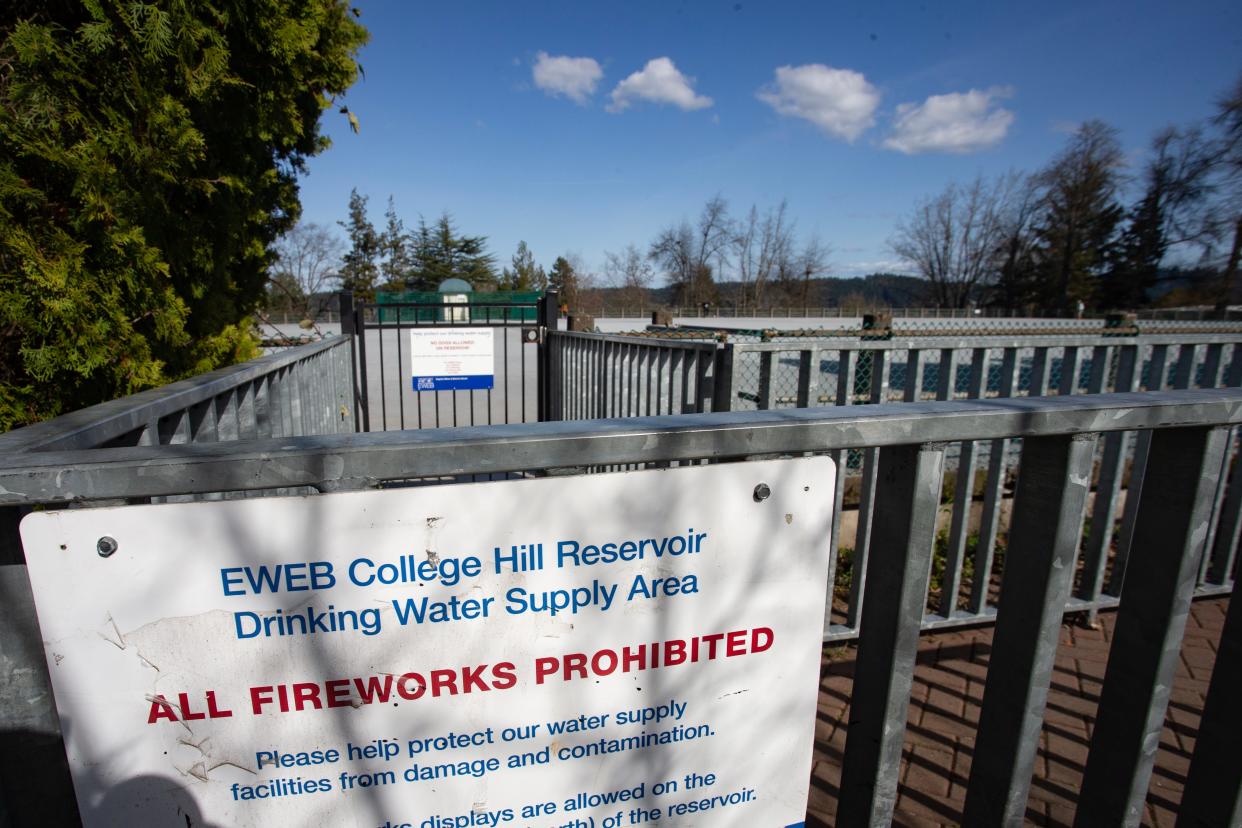Earthquake-proof storage tanks to replace College Hill Reservoir

Two new earthquake-proof drinking water storage tanks are set to replace the aging College Hill Reservoir, with construction starting as soon as 2024, according to the Eugene Water and Electric Board.
College Hill Reservoir serves all homes and businesses in Eugene, but it is nearing the end of its life. The 80-year-old reservoir fails to meet current seismic standards and is unlikely to survive a major earthquake, which could result in the city losing critical supplies of safe drinking water in the event of a disaster, EWEB said.
"The water that we all enjoy here in Eugene and rely on, it's safe, it's reliable, it's clean and tasty, but that water is impossible without the infrastructure that delivers it," Jen Connors, EWEB's communications and marketing supervisor, said.

Two smaller tanks will replace the reservoir. Each will store 7.5 million gallons of water, and they will be built to withstand a major earthquake. Smaller tanks are part of an EWEB strategy to diversify Eugene's storage system and enhance resiliency, water quality and operations, EWEB said.
While the current College Hill Reservoir serves as a popular place for community recreation, access to the top of the new reservoirs will be limited in order to secure drinking water, EWEB said.
Why is the replacement happening now?
The decision to begin the construction of the new storage tanks at College Hill came down to a few reasons, Connors said.
The Oregon Health Authority is requiring EWEB to decommission the College Hill Reservoir by the end of 2023 due to leaky roof joints, which present potential water risks, Connors said.
In 2020, EWEB informed College Hill neighbors of eventual plans to take the reservoir out of service and evaluated a demolition and construction schedule, EWEB said.
In order to decommission College Hill Reservoir, EWEB needed another storage facility to replace the 15 million gallons of water the reservoir holds.
In 2021, EWEB began constructing a new storage facility project at East 40th Avenue. Those new tanks are set to be finished by the end of this year and will replace the water that is lost when College Hill is taken out of service, Connors said.
Another main factor contributing to the project's timeline is the reservoir in Santa Clara. There is a network of tanks referred to as "base level" storage, EWEB said. The current network includes College Hill, a 20-million-gallon tank on Hawkins Lane and a 20-million-gallon tank in Santa Clara.
Like College Hill, the reservoir in Santa Clara is nearing the end of its useful life and will need to be replaced sooner than had been previously thought. Connors said it made the most sense to begin construction at College Hill next, so both storage facilities would not be under construction at the same time.
What does the decommissioning process look like?
EWEB will drain the water out of the College Hill Reservoir by the end of this year and then begin demolishing the concrete structure, Connors said. EWEB is still figuring out a demolition and construction timeline, but work could start as early as 2024.
Connors said it would likely take two and a half to three years to build the new water storage tank and get it connected to the rest of the system.
How much will this cost?
EWEB's capital plan for the College Hill water storage project includes just over $24 million, Connors said.
Funding for the project will include a combination of rate increases, reserve spending and debt, which will include borrowing or bonds, said EWEB communications specialist Aaron Orlowski. Ultimately, the cost to replace the reservoir is paid by EWEB customers through rates, he said.
EWEB will refine the costs over the next few months as it develops preliminary engineering plans and project schedules, Connors said.
How will this impact the community?
In terms of accessing water, Connors said customers won't be impacted by the project even while construction is happening. People can use their showers, turn on their sprinklers and have water like they always do.
The main impact will be on adjacent neighbors who witness the demolition and reconstruction of the new reservoir, Connors said. Taking a 15-million-gallon reservoir out of service, removing it and building new storage tanks is a major construction process, and it will take place in the middle of a residential neighborhood.
People who use the College Hill Reservoir for recreation will also be affected by construction, Connors said. The 2.5-acre top is a popular spot for walking, biking and other recreational activities.
Modern-day best practice is to secure drinking water storage and not have recreation on top of the tanks, Connors said. Once the new tanks are built, they will be fenced off so members of the public can't get on top of them, she said.
EWEB said it anticipates the public will continue to have access to the top of the reservoir at least through 2023.
After construction is finished, there will still be other areas on the College Hill property open to the public, Connors said. EWEB plans to start a public engagement process to ask neighbors and community members how they use the space and how they'd like to use it in the future.
EWEB said it has also begun working with the State Historic Preservation Office and a consultant to appropriately honor the reservoir's historic features and its role in the community since the 1930s.
"It's going to be a big change for the neighborhood and investment on behalf of our community, but a necessary investment that will serve generations to come," Connors said.
Makenzie Elliott covers breaking news and public safety for The Register-Guard. Reach her at MElliott@gannett.com. Find her on Twitter at @makenzielliott.
This article originally appeared on Register-Guard: Earthquake-proof storage tanks to replace College Hill Reservoir

